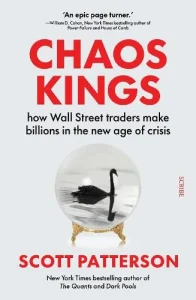‘Chaos Kings: How Wall Street Traders Make Billions in the New Age of Crisis’ by Scott Patterson
Apologies for the sensational title, but this book was reviewed by Katie Martin in the Weekend FT ten days ago. While I skim through several online news services during the week, I physically go out and buy a hard copy of my favourite newspapers to have a long read over the weekend. Print on paper is so much more relaxing than back-lit screens.
This new book aims to focus on/take a pop at (you choose) those who make money when financial markets lose value. The old name was ‘short sellers’; stock brokers call it ‘tactical allocation’ or something along those lines; most retail punters don’t understand the concept. At its heart is the opprobrium associated with naked selling, the Orwellian concept that buying something is ‘good’ – and act of faith or whatever – while selling anything is negative; selling something you don’t even own is dastardly.
Linked to this idea is the belief that trend following in a bullish market is easy, that leverage can burnish returns in such conditions, and as Katie says: ‘rock star status is reserved for a clique who have made storm- chasing in stocks and bonds in to something between an art and a science’.
chasing in stocks and bonds in to something between an art and a science’.
The focus of this book focuses on Nassim Nicholas Taleb, author of the very successful ‘The Black Swan’ published 2007 and its predecessor ‘Fooled by Randomness’ in 2004.Perhaps a pity because while Mr Taleb is indisputably very talented, it would appear that his one-time business partner Mark Spitznagel is the more interesting – and successful – hedge fund manager. He, like many others, started off at the Chicago Board of Trade and other futures and options exchanges around the world.
The point of these markets is that it’s as easy to sell as it is to buy, unlike stocks and bonds. Entry level requirements for trading are sometimes less onerous than for banking and broking clients, and margin trading comes as standard. Famous names from this area are Paul Tudor Jones, Jim Simons who founded Renaissance Technologies in 1982, and Mark Rich who went on to form the commodity giant Glencore. George Soros became notorious in Britain when he bet heavily in 1992 that the pound would weaken.
Separately, but pertinently, last week the UK Treasury proposed ditching the ban on ‘naked’ selling of UK government bonds, something proposed by the European Union in 2010 and implemented permanently in 2012 at the height of the chaos in the EU sovereign debt market. The UK didn’t vote for this move so it’s not surprising that the Treasury now says: ‘short selling of sovereign debt and owning sovereign Credit Default Swaps (CDS) generally contribute to the healthy functioning of the sovereign debt markets, promoting liquidity and facilitating price discovery’. At his Mansion House speech Chancellor Jeremy Hunt outlined plans to scrap ‘’almost 100 pieces of unnecessary retained EU law’’.
All the above happened as many markets have so little liquidity and turnover that data discovery and mining is currently very difficult indeed.
Tags: hedge funds, short-selling
The views and opinions expressed on the STA’s blog do not necessarily represent those of the Society of Technical Analysts (the “STA”), or of any officer, director or member of the STA. The STA makes no representations as to the accuracy, completeness, or reliability of any information on the blog or found by following any link on blog, and none of the STA, STA Administrative Services or any current or past executive board members are liable for any errors, omissions, or delays in this information or any losses, injuries, or damages arising from its display or use. None of the information on the STA’s blog constitutes investment advice.
Latest Posts
- Navigating the Market: Insights from Robin Griffiths and Ron William April 9, 2025
- Avoid Revenge Trading: The Key to Long-Term Trading Success March 31, 2025
- Mastering Relative Strength Portfolios: Key Takeaways from the March STA Meeting March 12, 2025
- Stay Disciplined, Stay Profitable February 26, 2025
- Understanding Price Gaps in Trending February 19, 2025




















Latest Comments